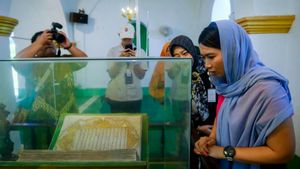Head of the Fiscal Policy Agency (BKF) of the Ministry of Finance, Febrio Kacaribu, assessed that the provision of tax incentives for the development of the Capital City of the Archipelago (IKN) would not interfere with the existing revenue base.
This incentive is mainly given to attract more private parties to invest in IKN.
"The principle is that we want to see new investments in IKN, then also cause crowds in, so we attract other investments to IKN again. This incentive will not erode our receiving base," said Febrio during a press conference at the KiTa State Budget in Jakarta, quoted from Antara, Tuesday, May 28.
Febrio said that the purpose of IKN development itself was directed at equitable development and economic growth. In order not to burden the State Revenue and Expenditure Budget (APBN) too much, funding is more focused on Government and Business Entity Cooperation (KPBU) and private investment.
"In encouraging this private role, the government has indeed prepared tax incentives. This is regulated in Government Regulation No. 12/2023, then regulated again with the Regulation of the Minister of Finance (PMK) No. 28/2024," he said.
SEE ALSO:
One of the incentives contained in PMK No. 28/2024 is the Article 21 Income Tax incentive facility (PPh) borne by the government (DTP) which is given to employees who work at IKN.
In Articles 123 Paragraph (3) and (4) PMK, it is explained that the employees in question are those who receive income from certain employers; reside in the IKN area; and have Taxpayer Identification Number (NPWP) registered at the tax service office whose working area covers the IKN area. The tax facility does not view the employee as a fixed status or contract.
The English, Chinese, Japanese, Arabic, and French versions are automatically generated by the AI. So there may still be inaccuracies in translating, please always see Indonesian as our main language. (system supported by DigitalSiber.id)
















